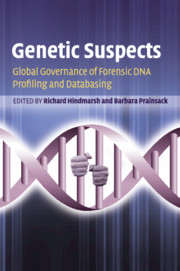Foreword
Published online by Cambridge University Press: 05 October 2012
Summary
Without science and its muscular twin technology, contemporary societies would be reduced to chaos. We would lose much of our ability to read, write, communicate, travel, grow crops, raise animals, cook food or find clean water to sustain our lives. Commercial transaction would stop; financial institutions be crippled; emergency services incapacitated, and hospitals no longer able to provide essential treatment. In that devastated, dying world, law and order would break down, and violence would flourish. Not insignificantly, we would lose the capacity to track and prosecute lawbreakers and criminals. Today, even law enforcement has become a ‘high-tech’ business, and DNA profiling, the subject of this book, is the most highly valued recent addition to the toolkit of the forensic sciences. For law enforcement agencies, it is hard to imagine life before or without it.
Technology's benefits for social order are obvious, ubiquitous and unquestionable. Yet, since long before the scientific revolution, human beings have looked upon the unchecked thirst for knowledge and its applications as dangerous things. Humanity's Faustian bargain with science set us on a path of discovering more and more about the way the world works and accomplishing more impressive feats with the results of that knowledge. But around the bends of the brightly lit corridors of enlightenment lurked unintended consequences that threatened to usurp our humanity and even annihilate us physically. Advances in the life sciences and technologies have proved particularly alarming because they destabilize the worth of life itself.
- Type
- Chapter
- Information
- Genetic SuspectsGlobal Governance of Forensic DNA Profiling and Databasing, pp. xix - xxivPublisher: Cambridge University PressPrint publication year: 2010
- 1
- Cited by



